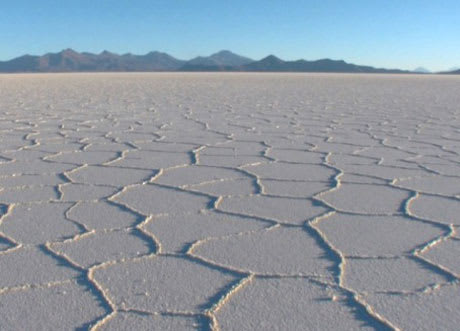In an effort to capture the quotidian reality of the mining life in southwestern Bolivia, Juan Vallejo's mostly silent, experiential documentary, Cerro Rico, Tierra Rica, documents in a literal classicist sense. He observes the daily grind of silver and tin miners in the Cerro Rico mountain near Potosi as well as the salt-mining regimen on the plains of the Salar de Uyuni, mirroring and melding their experiences to create a tapestry of past, present and future modes of identity for the region.
With little dialogue or extraneous music, save some atonal notes when the landscape is being explored and dissected, this slow-moving, contemplative work plays voyeuristically, detailing the surprisingly traditional approach to labour with handheld explosives and manually manipulated rock debris. We're also given some contextualizing views of the geography, heightening the barren and isolated nature of the community, which exacerbates the cyclic inevitability of generational mining.
Amidst this are occasional interviews with miners that express either happiness with the non-traditional work schedule and intermittent financial rewards, or displeasure with the support-based trap they find themselves in, drinking and smoking their days away to numb the tedium of repetitive tasks. Some discussion about early deaths arises on the periphery but isn't doted on for exploitive emotional manipulation.
Instead, Vallejo notes the history of Bolivian mining as a subjugating force of global economy, pointing out that the rich resources were typically shipped off to Argentina and eventually Spain. He juxtaposes this with the salt industry, which is primarily local, pointing out that the recently discovered lithium reserves under the ground of the Salar de Uyuni could point to substantial economic change, should the region escape their cycle of bottom rung labour.
Beautifully shot on digital video, this slightly bloated doc could have benefitted by using actual film, seeing as it's a highly visual experience. Although, considering the claustrophobic locales of the various mines and the flexibility needed to capture these moments firsthand, the freedom of digital helps build a tone and sense of tension.
It's rare for a documentary with political, economic and environmental themes to remain as balanced and dignified as Cerro Rico, Tierra Rica. Juan Vallejo's work is quite an achievement of cultural identity as fluid entity composed of past experience, present reality and future possibility.
(Pisco Films)With little dialogue or extraneous music, save some atonal notes when the landscape is being explored and dissected, this slow-moving, contemplative work plays voyeuristically, detailing the surprisingly traditional approach to labour with handheld explosives and manually manipulated rock debris. We're also given some contextualizing views of the geography, heightening the barren and isolated nature of the community, which exacerbates the cyclic inevitability of generational mining.
Amidst this are occasional interviews with miners that express either happiness with the non-traditional work schedule and intermittent financial rewards, or displeasure with the support-based trap they find themselves in, drinking and smoking their days away to numb the tedium of repetitive tasks. Some discussion about early deaths arises on the periphery but isn't doted on for exploitive emotional manipulation.
Instead, Vallejo notes the history of Bolivian mining as a subjugating force of global economy, pointing out that the rich resources were typically shipped off to Argentina and eventually Spain. He juxtaposes this with the salt industry, which is primarily local, pointing out that the recently discovered lithium reserves under the ground of the Salar de Uyuni could point to substantial economic change, should the region escape their cycle of bottom rung labour.
Beautifully shot on digital video, this slightly bloated doc could have benefitted by using actual film, seeing as it's a highly visual experience. Although, considering the claustrophobic locales of the various mines and the flexibility needed to capture these moments firsthand, the freedom of digital helps build a tone and sense of tension.
It's rare for a documentary with political, economic and environmental themes to remain as balanced and dignified as Cerro Rico, Tierra Rica. Juan Vallejo's work is quite an achievement of cultural identity as fluid entity composed of past experience, present reality and future possibility.
